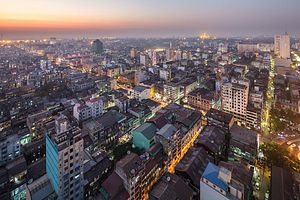Chinese domination of Myanmar can not be denied, as China is Myanmar’s top trading partner, and over the past three decades has also emerged as the single largest source of foreign direct investment (FDI) in the southeast Asian state. Myanmar-China bilateral trade had already reached $5.5 billion in the first half of the present fiscal year. Myanmar mainly exports agricultural and animal products and minerals to China, while it imports machine, electronic, and other consumer products. Trade is not excessively favorable towards China, as Myanmar exports to China are valued at $2.46 billion, while imports are estimated at $3 billion.
China is also a major in investor in Myanmar. It has invested over $14 billion since 1988, accounting for one-third of the total foreign investment in the Southeast Asian country. Perhaps most importantly, after numerous delays, the Sino-Myanmar crude gas pipeline, which runs between the deep-water port of Kyaukpyu in Myanmar, on the Bay of Bengal, and Kunming in China’s Yunnan province, became operational this year. Kyaukpyu port and the new pipeline enables China to import crude from the Middle East and Africa with relying on shipping lanes in Straits of Malacca and the South China Sea. Myanmar of course will get royalty payments along with experience in energy infrastructure development and management.
However, Myanmar had begun to look at other alternatives to China even before its democratic transition took place. In the economic sphere, countries like Japan and Singapore are investing heavily. A strong reiteration of this point is that for the first six months of FY2017-2018, Singapore has even overtaken China in terms of investment. This year in June, for example, trade agency IE Singapore signed a memorandum of understanding with the Myanmar Investment Commission (MIC). The MOU will allow more Singapore firms to explore collaborations in urban and housing solutions; utilities; transport and logistics; manufacturing; oil and gas; and professional services.
Phee Group, a multinational shipping and logistics pioneer from Singapore, is helping Myanmar develop logistic infrastructure to cater to international trade. Singapore firm Bok Seng Logistics has teamed up with Ayeyar Hinthar, the largest conglomerate in the Ayeyarwady region to develop logistics hubs services. Greater investment by Singapore has advantage for Myanmar over Chinese funds. For one thing, Singapore is politically neutral in the context of the geopolitical dynamics of ASEAN, and Myanmar’s locals do not feel threatened by Singaporean investment.
Japanese economic presence in Myanmar is also increasing. Thilawa Special Economic Zone, less than an hour’s drive from downtown Yangon, has been jointly developed by both Myanmar and the Japan International Cooperation Agency (JICA). Myanmar Japan Thilawa Development (MJTD), a joint venture between Japan and Myanmar, is in charge of development and management. Three major Japanese trading houses – Marubeni, Sumitomo, and Mitsubishi – and JICA jointly own 49 percent of MJTD. Moreover, 21 Japanese companies are planning to invest in the SEZ. Apart from the Thilawa SEZ, only recently, the JFE Steel Corporation, Meranti Steel, JFE Shoji Trade Corporation, Marubeni-Itochu Steel Inc, and Hanwa Co. established a manufacturing and sales company, JFE Meranti Myanmar Co, in Myanmar through a Singapore-based holding company.
What is interesting about Japan’s engagement with Myanmar is that it is not only focusing on trade and investment. JICA has been helping with capacity building in areas like agriculture and information technology. JICA and the Japan Science and Technology Agency (JST) are collaborating with Myanmar’s government in rice genomic breeding to boost the sustainable utilization of bio-resources. JICA is also helping Myanmar in important areas like information technology and communication, which will bolster its economic growth and development. JICA has established the Information and Communication Technology Training Institute (ICTTI) to impart practical training, mainly in network technology. According to the program, Japan has trained 20 information and network technology instructors, who are providing training to 200 students per year at ICTTI.
Japan’s engagement with Myanmar categorically shows that its style of engagement, less obtrusive than China, could make it an attractive partner for quality infrastructure projects in Southeast Asia. With the United States playing an unpredictable role in Southeast Asia under the Trump administration, Japan can play a broader role. Its approach is not just economic expansion, but also creating robust institutions that can facilitate economic growth. It will of course need to work with other countries which are vary of China’s hegemonic designs in the Indo-Pacific region.
Japan’s approach toward Myanmar is clearly a reiteration of the point that Tokyo has an alternative narrative to offer to the Chinese story. It may not be so ambitious, but it certainly is more sustainable.
Tridivesh Singh Maini is a New Delhi based Policy Professional associated with The Jindal School of International Affairs, OP Jindal Global University, Sonipat.
Sandeep Sachdeva is an Independent Policy Analyst.

































